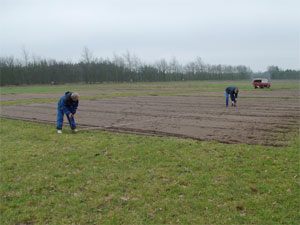|
A two-day meeting in Vienna for CORE Pilot Projects
Network in CORE Organic
A CORE Organic report discuss scientific evaluation
Facilities and training
A new report discuss possibilities for imrpoved use of research facilities and topics
An overview of current topics
Eight trans-national research projects have recently been launched
|
Report on improved use of research facilities, topics relevant for integration, and university education
|
|
|
A new report describes the possibilities of different research facilities to fulfil the research needs established by the participating countries of the CORE Organic project.
| At present the most important research topics among the partners are within the categories Environmental aspects, Animal husbandry, and Values, standards and certification. Environmental aspects and Soil can be studied in Long-term experiments, including leaching fields and Animal husbandry research can be carried out on-farm or in Animal research facilities, which are not available in all participating countries and thus the coordination of their use is very important.
A good number of research needs, which are in the interest of several partners, are found in Farming systems as well as in Food systems category (Food security, food quality and human health, Markets and trade, Policy environments and social economy, Produce chain management, Recycling, balancing and resource management). Research farms and experimental fields, On-farm research and Permanent networks can be used in primary production research in the context of the study of the food chain as a whole.
|
 |
The objective of the CORE Organic WP4 was to present a proposal concerning more effective and improved use of research facilities, and topics relevant for integration in joint research projects. At the moment facilities are being shut down in many countries, and more effective trans-national use of the facilities could be an answer to the problems involved. It is suggested that the facility owners and researchers should be invited to discuss which facilities are the most important and should be maintained for trans-national research projects. This requires money for travelling, which is why this kind of meeting or workshop should be a topic of the next joint action in the future coordination project.
The other aim of WP4 was to create a scheme for training of research personnel and exchange of experts to promote the exchange of experiences on how to conduct research by means of a systems and systemic approach. This was partly done by collecting information on the university-level education on OFF in the participating countries. This information is forwarded to two ongoing projects which deal with education in OFF. It is also suggested that the training scheme should be a topic (or part of it) of the next coordination action of OFF. It is also possible to include this kind of scheme in Marie Curie actions under FP7. As it is assumed that in the future more research is carried out on-farm and in networks instead of ‘traditional’ field experiments, research methodology is needed for teaching researchers as well as for research personnel. A common methodology for long-term experiment research is also needed.
Report on improved use of research facilities and topics relevant for integration, and training schemes (PDF)
Compiled by Arja Nykänen, Ministry of Agriculture and Forestry, Finland
|
|

